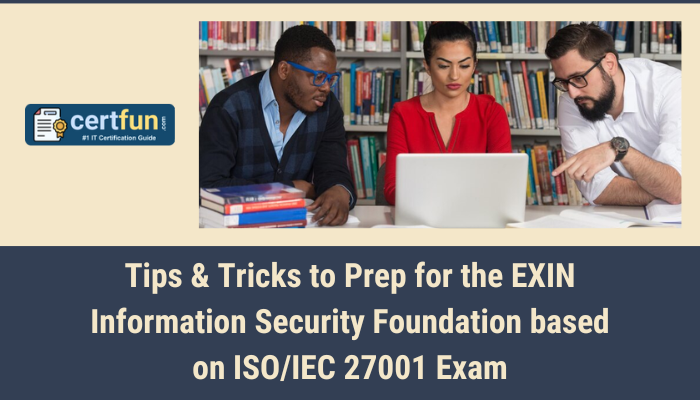
EXIN Information Security Foundation based on ISO/IEC 27001 Exam is pivotal in today's landscape, where the risk of information breaches and security threats is increasingly prominent. This certification equips professionals with essential knowledge to safeguard sensitive data. This article explores the EXIN Information Security Foundation certification, detailing its components and discussing its profound impact on career advancement and organizational security resilience.
What Is the EXIN Information Security Foundation based on ISO/IEC 27001 Exam?
The EXIN Information Security Foundation based on ISO/IEC 27001 Exam is a prestigious certification that tests candidates on their understanding of the importance of information security and the inherent threats and risks. This exam is not limited to IT professionals alone; it is crucial for anyone who handles confidential information, making it a versatile accreditation useful across various industries and job roles.
Key Features of the Exam:
-
Number of Questions: It consists of 40 multiple-choice questions.
-
Duration: The exam lasts for 1 hour.
-
Pass Mark: A minimum of 65% is required to pass.
-
Exam Type: It is a closed-book exam, and electronic devices are prohibited.
-
Level: This certification is at the Foundation level.
-
Languages Offered: The exam is available in Chinese, Dutch, English, German, Japanese, and Portuguese.
Why Should You Consider the EXIN Information Security Foundation Certification?
1. Broad Application and Relevance
Whether you are an IT professional, a small business owner, or an entrepreneur, the EXIN Information Security Foundation certification is relevant to you. The certification provides a robust base for understanding and implementing information security measures, essential for protecting business operations and sensitive data against security threats.
2. Stepping Stone for Advanced EXIN Certifications
Achieving the EXIN Information Security Foundation certification sets the groundwork for pursuing advanced information security certifications. It covers the core concepts that are crucial for deeper specialized studies in the field of information security.
3. Compliance with International Standards
The ISO/IEC 27001 standard is globally recognized for setting the benchmark for information security management systems. By aligning with these standards, the certification ensures that you are equipped with up-to-date and internationally approved information security knowledge.
How to Study for the EXIN Information Security Foundation based on ISO/IEC 27001 Exam?
1. Understand the ISO/IEC 27001 Framework
Begin your preparation by gaining a thorough understanding of the ISO/IEC 27001 standards. Familiarize yourself with its components like risk management, security controls, and compliance requirements which are integral parts of the exam.
2. Leverage Official Study Materials
Utilize study guides and materials provided by EXIN. These resources are tailored to cover all the topics in the exam and are updated regularly to reflect the latest information security trends and practices.
3. Practical Application
Try to apply the ISO/IEC 27001 framework principles in your current job role or through case studies. Practical application helps in understanding complex concepts and remembering them easily.
4. Join Study Groups and Forums
Engage with other professionals preparing for the same certification through online forums and study groups. This can provide insights into difficult concepts and new study strategies.
5. Practice Tests
Take regular practice tests to assess your knowledge and readiness for the actual exam. Practice tests help identify your weak areas that need more focus.
10 Additional tips for EXIN ISFS Exam Success
1. Review Exam Objectives
Always start your preparation by thoroughly reviewing the exam objectives to understand what topics are most important and how they are weighted on the exam.
2. Set a Study Schedule
Create a realistic study schedule and stick to it. Consistent, focused study sessions are more effective than cramming all the material at once.
3. Utilize Flashcards
Create or use online flashcards for key terms and concepts. This technique helps reinforce memory retention and quick recall of important information.
4. Attend Workshops and Seminars
Look for workshops, seminars, or webinars that focus on ISO/IEC 27001 and information security. These can provide valuable insights and a deeper understanding of complex topics.
5. Watch Tutorial Videos
Utilize tutorial videos from reputable sources to help explain complicated subjects or to provide a different perspective on the study material.
6. Use Multiple Study Resources
Don't rely solely on one study resource. Use a mix of official textbooks, online courses, and study guides to cover all the necessary topics comprehensively.
7. Take Notes Effectively
Practice effective note-taking by summarizing key points and writing down your own explanations. This helps in better understanding and retention of the study material.
8. Discuss with Peers or Mentors
Engage in discussions with peers or seek a mentor who has experience with the ISO/IEC 27001 framework. Conversations can clarify doubts and provide new insights.
9. Stay Updated
Keep yourself updated with any changes in the ISO/IEC 27001 standards and updates related to the EXIN exam to ensure your study material is current.
10. Relax Before the Exam
Finally, give yourself enough time to relax and rest before the exam day. A well-rested mind is more efficient during exams. Avoid last-minute studying which can lead to confusion and increase anxiety.
Conclusion
The EXIN Information Security Foundation based on ISO/IEC 27001 Exam is not just an exam; it is a comprehensive introduction to the world of information security. With its wide applicability and international recognition, this certification can serve as a career milestone. By securing this foundation-level certification, you are not only enhancing your understanding of essential security practices but also demonstrating your commitment to maintaining best practices in information security within your organization.
